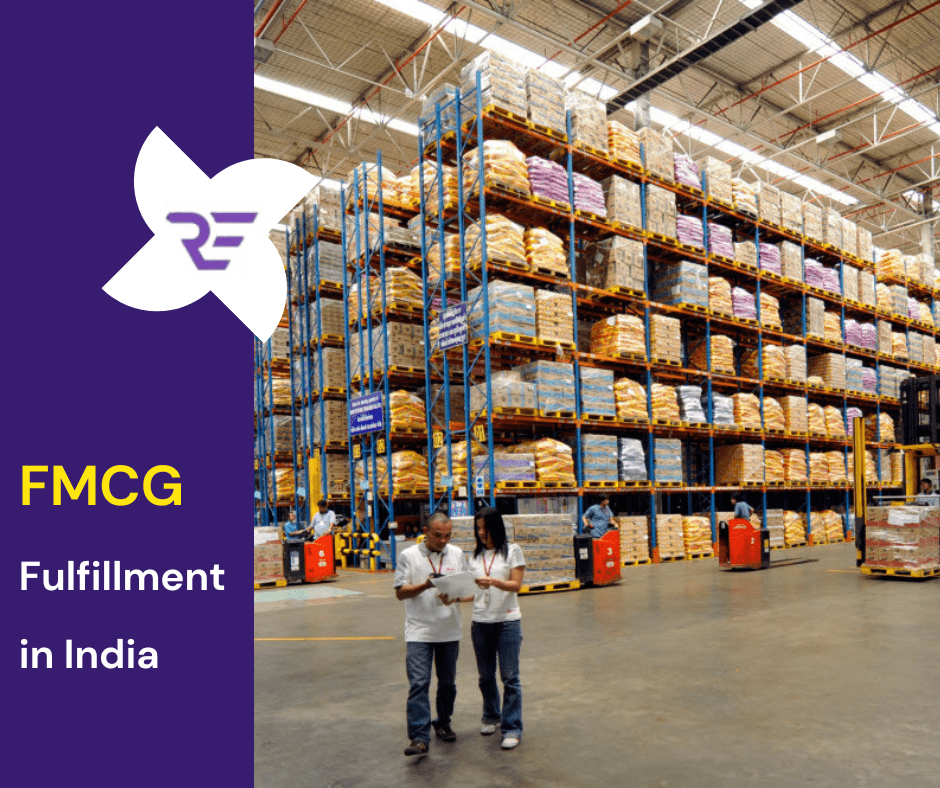Warehousing

Smart Fulfillment Strategies for 2025
In the rapidly evolving Indian market, the fast-moving consumer goods (FMCG) sector is undergoing a major transformation. What once was a distribution challenge has now become a fulcrum of competitive advantage. From manufacturers to brands to distributors and logistics partners, everyone is rethinking how to fulfil FMCG demand faster and smarter.
The scale of the opportunity is staggering. India’s FMCG industry is expanding steadily, powered by rising incomes, growing aspirations, digital penetration, and increasing rural consumption. At the same time, consumer expectations are changing: convenience, choice, speed and transparency are becoming as important as price. For warehousing and fulfilment players focusing specifically on FMCG, the time is propitious. The mere fact that online channels in FMCG may account for ~40% of consumption by 2030 underscores the structural change afoot. FMCG brands will increasingly outsource fulfilment to partners who can deliver speed, flexibility and reliability.
Why Fulfillment Matters for FMCG -
In this environment, fulfillment isn’t just “moving boxes from A to B” — it’s a strategic determinant of cost, service level, brand experience and ultimately, growth. Consider the following forces:
Speed & proximity
With consumers used to rapid delivery, the traditional 2-5 day model in FMCG is under pressure. Brands are looking to locate inventory closer to demand centres (micro-warehouses, “dark stores”) and optimise last-mile operations.
Complexity of channels
Today’s FMCG landscape is omnichannel: modern trade, traditional kiranas, e-commerce marketplaces, quick commerce, D2C portals. Fulfillment networks must serve all — reliably, and without bloating costs.
Cost and margin pressure
Logistics in India still consumes a significant share of costs. Fragmented retail, challenging infrastructure, geo-diversity all add to the burden. Improving fulfilment efficiency is therefore a key lever for margin improvement.
Technology and data
Companies are deploying advanced analytics, route optimization, demand forecasting and inventory planning to enable smarter fulfilment. Technologies such as IoT in warehousing, AI for routing, and real-time tracking are becoming standard.
Sustainability and resilience
With increasing regulatory and consumer focus on sustainability, FMCG supply chains are under pressure to adopt efficient, lower-carbon models. Fulfilment networks are being redesigned accordingly — e.g., micro-fulfilment centres, EV fleets, optimized packaging and reverse logistics.
Key Factors to Look for in a Warehousing and Fulfillment Partner -
As the FMCG and e-commerce landscape evolves, choosing the right fulfillment partner can directly impact a brand’s growth, cost efficiency, and customer satisfaction. The ideal warehousing and logistics partner should offer more than just storage — they should act as a strategic enabler for your supply chain.
Here are the key factors to consider:
Strategic warehouse locations: Establish facilities closer to high-demand nodes (urban clusters, Tier 2/3 towns like Bhiwandi) to reduce lead times and delivery costs.
Flexible inventory handling: FMCG products often have short shelf-lives (especially perishable goods), high SKU counts, frequent promotions and seasonal surges. Warehousing must be agile.
Technology integration: Offer real-time visibility, warehouse management systems (WMS), linking to brand/distributor systems, enabling smarter demand-supply matching.
Omnichannel readiness: Serve both bulk shipments to traditional trade and smaller, rapid shipments to quick-commerce or kirana store restocking.
Sustainability features: Facilities with solar power, energy-efficient equipment, optimized layouts, and perhaps supporting reverse logistics.
Scalability and peak readiness: FMCG demand peaks during festivals, monsoons, rural harvest seasons. Fulfilment partners should be ready for volume surges.
End-to-end partner model: Beyond just storage, fulfilment partners can add value via cross-dock, packaging, reverse logistics, value-added services (labeling, bundling), thereby becoming a growth enabler for FMCG brands.
Powering FMCG Growth from Bhiwandi to India -
As India’s FMCG and e-commerce ecosystem races toward faster, more intelligent fulfillment, the need for dependable logistics partners has never been greater. From metros to emerging markets, brands are seeking speed, accuracy, and scalability — all anchored in efficient warehousing.
Located in Bhiwandi, one of India’s most strategic logistics hubs, Robin Enterprises provides end-to-end warehousing and fulfillment solutions designed specifically for the FMCG sector. With technology-driven operations, optimized distribution, and sustainable practices, Robin Enterprises ensures that your products move faster, smarter, and stronger — across every corner of India.
👉 Ready to accelerate your FMCG or e-commerce supply chain?
Empower your business with Robin Enterprises Warehouse & Logistics — delivering faster, smarter, and more sustainable fulfillment solutions in Bhiwandi.
📞 Call: +91 9167261110
📧 Email: info@robinenterprises.co.in
🌐 Visit: robinenterprises.co.in
Your Trusted Warehousing Partner !
Related Posts
What’s Next in FMCG Warehousing in India: Emerging Trends & Innovations for 2025
Warehousing September 25, 2025 Robin Enterprises The Role of 3PL Warehousing in Mega Sales. Every year, as the festive season kicks off in India, so…

